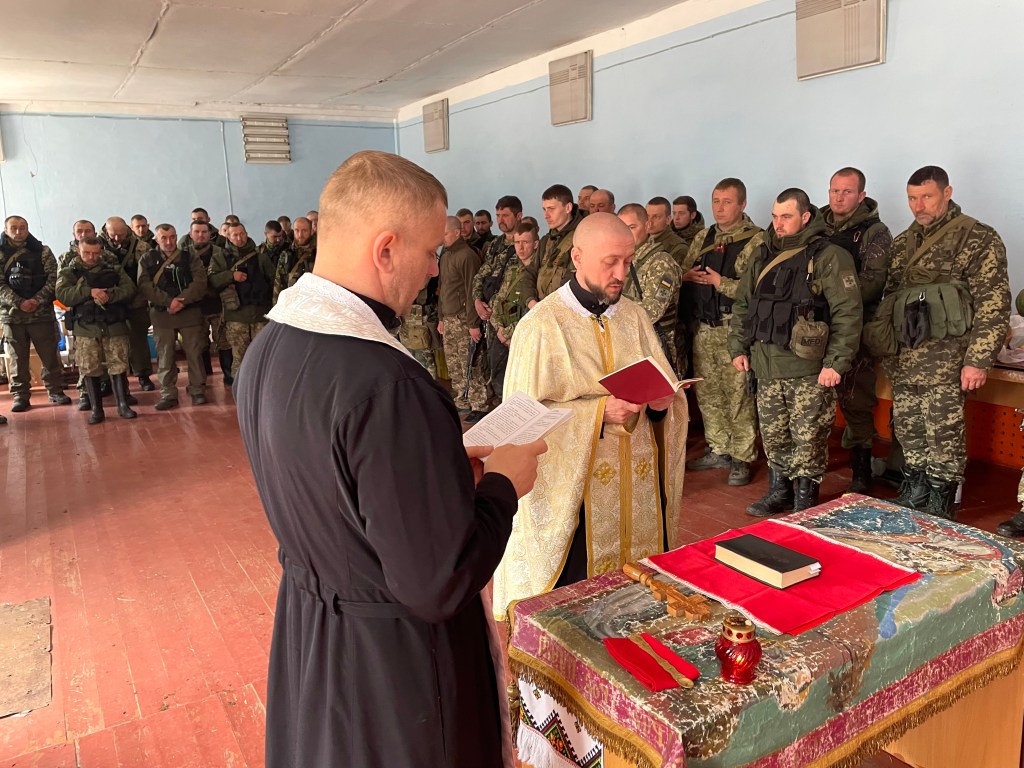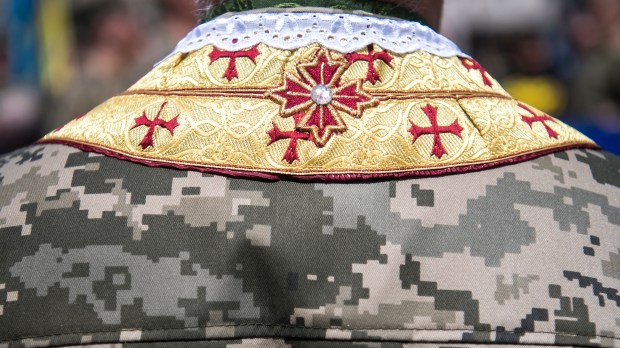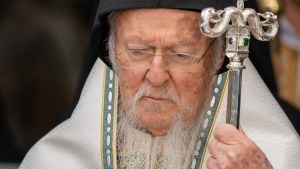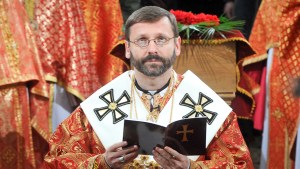Looking back on a year of war in his Ukrainian homeland, Jesuit Fr. Andriy Zelinskyy rues the fact that in the 21st century, one modern country could invade another modern, yet weaker, European country that posed no threat to it.
Like many observers of the Russian invasion of Ukraine, Fr. Zelinskyy thought that such an action could not happen again after the devastation of the Second World War.
“We thought we finished with it in the last century, after World War II. No. It came out again,” said Fr. Zelinskyy, Kyiv-based coordinator of military chaplains for the Ukrainian Greek Catholic Church. “We’re talking about Russia, which means that our civilized humanity of the 21st century is still capable of this unprovoked inhumane behavior on such a scale.”
For 43-year-old Fr. Zelinskyy, what that means is that not only Russians are capable of such behavior. “It means that humanity has not yet digested well the challenges of the past, that we have not yet made a happy future, that the generations before have missed something, that they were not paying attention.”
Zelinskyy served as a military chaplain in Mykolaiv and Mariupol during Ukraine’s struggle since 2014 to defend its eastern territories against a Russia-backed insurgency. He now coordinates the process by which priests become military chaplains. He also tries to find every possible opportunity to go to the front lines and serve Ukrainian troops.
He spoke with Aleteia through Facebook Messenger, having recently returned from the south of Ukraine.

“The trip from Mykolaiv to Kherson was horrible because you see ruins everywhere, and I can only imagine how the occupied parts of the country look,” he said.
Love of life
In spite of widespread destruction, people are not waiting for the end of hostilities to rebuild and live their lives. “This may be one of the most important characteristics of the situation in Ukraine, if you try to analyze it a year after” the February 24, 2022, invasion, he said. In his own neighborhood in Kyiv, for example, which was hit by three missiles last October, a huge hole in the middle of the road was quickly filled in.
“Now you can’t even see where it happened,” he said. “It seems to me that this is one of the factors that helped us to go through this, through all this story for the last 12 months – the strength of our resilience and our love of life.”
Fr. Zelinskyy finds the morale of soldiers to be “very, very high,” a fact he attributes to their belief in their cause and their indignation toward the gruesome things they see when they liberate territory from Russian forces, such as evidence of torture and mistreatment of civilians.
“When our soldiers see what happens there, we definitely don’t want to live in this,” he said, referring to the fear of Ukraine being controlled by Moscow, as it was in the days under the Soviet Union.
Similarly, Ukrainians for the most part believe they will prevail in the current struggle, in part because they saw their military, with the help of Western military aid, stand up to what was considered one of the most powerful armies in the world and take back a third of the territory that Russia had initially occupied.
But victory means restoration of all the territories Russia has snatched from Ukraine, including Crimea, which it has occupied since 2014, soon after the Revolution of Dignity led to the overthrow of pro-Kremlin Ukrainian President Viktor Yanukovych.
“We must be careful about this, to say now ‘OK, well, let’s forget it; let’s leave those territories for Russia, the territories that they got, and let’s leave something for the Ukrainians,” Zelinskyy said. “’Let’s have peace.’ If this happened once, this will happen tomorrow again, if the evil is not punished. Sustainable peace requires justice, restoration of the international order.”
Serving humanity in military attire
In the meantime, Fr. Zelinskyy continues to help provide the Ukrainian military with chaplains, being attentive to the concern of Major Archbishop Sviatoslav Shevchuk, head and father of the Ukrainian Greek Catholic Church, that Catholic military chaplains remember that they are priests first. It’s not always easy to provide the sacraments, especially the Divine Liturgy, under war conditions.

“For example, for Christmas we had to find a proper place to pray together, but it was at the front,” Zelinskyy said. “When we gather together we become a target, so you have to find a place that cannot even be suspected [where people are gathered]. You have to think not twice but five times, so that this could be done — the Mass celebrated, confessions listened to and the spiritual needs of our military well attended. It all requires particular caution because we’re talking about an artillery war where missiles land everywhere. There is no safe hiding place in Ukraine nowadays.”
But chaplains are also there to listen to the concerns of soldiers and offer counsel.
“It’s not only about the sacraments but about attending to their humanity,” Fr. Zelinskyy said. “That is for me one of the greatest tools in the arsenal that a chaplain has, to tend to the needs of humanity. I usually say that the mission of the military chaplain is to protect humanity dressed in a military uniform.”



